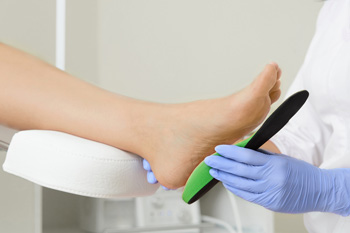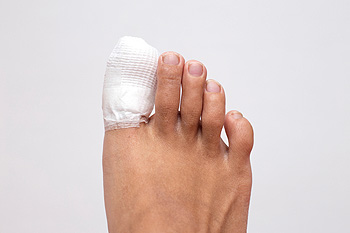Connect With Us
Blog
Items filtered by date: November 2020
What Conditions Do Orthotics Help?
 Orthotics are custom made shoe inserts that are prescribed by a doctor to treat a variety of foot conditions. Orthotics can help correct deformities in the feet, help with foot and ankle function, support the ankle, and reduce the risk of injuries. Medical conditions that orthotics can be prescribed for include back pain, arthritis, flat feet, hammer toes, heel spurs, bunions, plantar fasciitis and high arches. If you are curious about getting custom orthotics, check with your podiatrist to see if they’re right for you. Your podiatrist will ask questions about your symptoms, look for any deformities, and check to see how your feet perform during certain activities.
Orthotics are custom made shoe inserts that are prescribed by a doctor to treat a variety of foot conditions. Orthotics can help correct deformities in the feet, help with foot and ankle function, support the ankle, and reduce the risk of injuries. Medical conditions that orthotics can be prescribed for include back pain, arthritis, flat feet, hammer toes, heel spurs, bunions, plantar fasciitis and high arches. If you are curious about getting custom orthotics, check with your podiatrist to see if they’re right for you. Your podiatrist will ask questions about your symptoms, look for any deformities, and check to see how your feet perform during certain activities.
If you are having discomfort in your feet and would like to try orthotics, contact Tanisha Richmond, DPM from Richmond Foot & Ankle, LLC. Our doctor can provide the care you need to keep you pain-free and on your feet.
What Are Orthotics?
Orthotics are inserts you can place into your shoes to help with a variety of foot problems such as flat feet or foot pain. Orthotics provide relief and comfort for minor foot and heel pain but can’t correct serious biomechanical problems in your feet.
Over-the-Counter Inserts
Orthotics come in a wide variety of over-the-counter inserts that are used to treat foot pain, heel pain, and minor problems. For example, arch supports can be inserted into your shoes to help correct overarched or flat feet, while gel insoles are often used because they provide comfort and relief from foot and heel pain by alleviating pressure.
Prescription Orthotics
If over-the-counter inserts don’t work for you or if you have a more severe foot concern, it is possible to have your podiatrist prescribe custom orthotics. These high-quality inserts are designed to treat problems such as abnormal motion, plantar fasciitis, and severe forms of heel pain. They can even be used to help patients suffering from diabetes by treating foot ulcers and painful calluses and are usually molded to your feet individually, which allows them to provide full support and comfort.
If you are experiencing minor to severe foot or heel pain, it’s recommended to speak with your podiatrist about the possibilities of using orthotics. A podiatrist can determine which type of orthotic is right for you and allow you to take the first steps towards being pain-free.
If you have any questions please contact our office located in Dayton, OH . We offer the newest diagnostic and treatment technologies for all your foot and ankle needs.
Do Your Child's Feet Hurt?
Are There Relief Options for Arthritic Foot Pain?
 Arthritis is a common ailment in patients who are over 65 years of age. It is a condition that can affect the feet and cause severe pain and discomfort. There are simple stretches and exercises which can help to ease some of the pain. Flexibility may be improved, and there can be an increase in synovial joint fluids as a result of frequently performing stretches. Additionally, an exercise routine can be beneficial in increasing existing range of motion. There may be more aggressive measures that can be implemented which may help to reduce arthritis foot pain. These can include changing specific eating habits, medication, or possibly joint replacement surgery. If you have arthritis in your foot, it is suggested that you speak with a podiatrist who can determine what the best course of treatment is for you.
Arthritis is a common ailment in patients who are over 65 years of age. It is a condition that can affect the feet and cause severe pain and discomfort. There are simple stretches and exercises which can help to ease some of the pain. Flexibility may be improved, and there can be an increase in synovial joint fluids as a result of frequently performing stretches. Additionally, an exercise routine can be beneficial in increasing existing range of motion. There may be more aggressive measures that can be implemented which may help to reduce arthritis foot pain. These can include changing specific eating habits, medication, or possibly joint replacement surgery. If you have arthritis in your foot, it is suggested that you speak with a podiatrist who can determine what the best course of treatment is for you.
Arthritis can be a difficult condition to live with. If you are seeking treatment, contact Tanisha Richmond, DPM from Richmond Foot & Ankle, LLC. Our doctor can provide the care you need to keep you pain-free and on your feet.
Arthritic Foot Care
Arthritis is a joint disorder that involves the inflammation of different joints in your body, such as those in your feet. Arthritis is often caused by a degenerative joint disease and causes mild to severe pain in all affected areas. In addition to this, swelling and stiffness in the affected joints can also be a common symptom of arthritis.
In many cases, wearing ill-fitting shoes can worsen the effects and pain of arthritis. Wearing shoes that have a lower heel and extra room can help your feet feel more comfortable. In cases of rheumatoid arthritis, the arch in your foot may become problematic. Buying shoes with proper arch support that contour to your feet can help immensely.
Alleviating Arthritic Pain
- Exercises that stretch the foot can prevent further pain and injury and increase mobility
- Most of the pain can be alleviated with anti-inflammatory drugs, heat, and topical medications
- Massages can help temporarily alleviate pain.
It is best to see your doctor for the treatment that is right for your needs and symptoms. Conditions vary, and a podiatrist can help you determine the right method of care for your feet.
If you have any questions, please feel free to contact our office located in Dayton, OH . We offer the newest diagnostic tools and technology to treat your foot and ankle needs.
Is My Toe Mildly or Severely Fractured?
 A common injury that many patients can endure is a broken toe. This can be the painful result of a heavy object falling on the toe, or from stubbing the toe against a piece of furniture. Common symptoms that are generally associated with a broken toe include severe pain, swelling, and bruising. If the fracture is severe, the bone may dislocate and protrude from the skin. If the toe is mildly broken, relief may be found by taping the affected toe to the toe next to it. This is referred to as buddy taping, and may provide the necessary stability as the healing process takes place. If you suspect that you have a broken toe, it is strongly recommended that you consult with a podiatrist who can offer you treatment options.
A common injury that many patients can endure is a broken toe. This can be the painful result of a heavy object falling on the toe, or from stubbing the toe against a piece of furniture. Common symptoms that are generally associated with a broken toe include severe pain, swelling, and bruising. If the fracture is severe, the bone may dislocate and protrude from the skin. If the toe is mildly broken, relief may be found by taping the affected toe to the toe next to it. This is referred to as buddy taping, and may provide the necessary stability as the healing process takes place. If you suspect that you have a broken toe, it is strongly recommended that you consult with a podiatrist who can offer you treatment options.
Broken toes may cause a lot of pain and should be treated as soon as possible. If you have any concerns about your feet, contact Tanisha Richmond, DPM from Richmond Foot & Ankle, LLC. Our doctor will treat your foot and ankle needs.
What Is a Broken Toe?
A broken toe occurs when one or more of the toe bones of the foot are broken after an injury. Injuries such as stubbing your toe or dropping a heavy object on it may cause a toe fracture.
Symptoms of a Broken Toe
- Swelling
- Pain (with/without wearing shoes)
- Stiffness
- Nail Injury
Although the injured toe should be monitored daily, it is especially important to have a podiatrist look at your toe if you have severe symptoms. Some of these symptoms include worsening or new pain that is not relieved with medication, sores, redness, or open wounds near the toe.
If you have any questions, please feel free to contact our office located in Dayton, OH . We offer the newest diagnostic and treatment technologies for all your foot care needs.
Wounds That Don't Heal Need to Be Checked
Washing and Moisturizing the Feet
 Many people understand the importance of maintaining proper care for their hair and skin, but often neglect their feet. This may lead to developing fungal or bacterial infections, cracked heels, and other foot conditions. Patients can notice how good their feet can feel when they are soaked in warm water at the end of the day, dried thoroughly, followed by applying a moisturizer. Exfoliation can be effective in removing existing dry skin, and this is accomplished by using a pumice stone. Environmental damage may be prevented when comfortable socks and shoes are frequently worn, and it may also help to limit wearing high heels. If you would like additional information about how to perform daily foot care routines, it is suggested that you consult with a podiatrist.
Many people understand the importance of maintaining proper care for their hair and skin, but often neglect their feet. This may lead to developing fungal or bacterial infections, cracked heels, and other foot conditions. Patients can notice how good their feet can feel when they are soaked in warm water at the end of the day, dried thoroughly, followed by applying a moisturizer. Exfoliation can be effective in removing existing dry skin, and this is accomplished by using a pumice stone. Environmental damage may be prevented when comfortable socks and shoes are frequently worn, and it may also help to limit wearing high heels. If you would like additional information about how to perform daily foot care routines, it is suggested that you consult with a podiatrist.
Everyday foot care is very important to prevent infection and other foot ailments. If you need your feet checked, contact Tanisha Richmond, DPM from Richmond Foot & Ankle, LLC. Our doctor can provide the care you need to keep you pain-free and on your feet.
Everyday Foot Care
Often, people take care of their bodies, face and hair more so than they do for their feet. But the feet are a very important aspect of our bodies, and one that we should pay more attention to. Without our feet, we would not be able to perform most daily tasks.
It is best to check your feet regularly to make sure there are no new bruises or cuts that you may not have noticed before. For dry feet, moisturizer can easily be a remedy and can be applied as often as necessary to the affected areas. Wearing shoes that fit well can also help you maintain good foot health, as well as making it easier to walk and do daily activities without the stress or pain of ill-fitting shoes, high heels, or even flip flops. Wearing clean socks with closed shoes is important to ensure that sweat and bacteria do not accumulate within the shoe. Clean socks help to prevent Athlete’s foot, fungi problems, bad odors, and can absorb sweat.
If you have any questions please feel free to contact our office located in Dayton, OH . We offer the newest diagnostic and treatment technologies for all your foot and ankle needs.
Do I Have an Ingrown Toenail?
 The condition that is referred to as ingrown toenails is quite a common ailment. It occurs as a result of the outer edges of the toenail growing into the surrounding skin. The big toe is often affected when this condition develops, and it may happen for several reasons. These can consist of genetic factors, certain medical conditions, and wearing shoes that do not have adequate room for the toes to move freely in. Patients who are diabetic or who have poor circulation, may be prone to developing ingrown toenails. Some of the symptoms that are associated with ingrown toenails can include tenderness around the affected toe, swelling, and in severe cases, a discharge may be evident. Possible prevention techniques can include trimming the toenails correctly, and wearing shoes and socks that fit properly. If you are afflicted with an ingrown toenail or seem to have reoccurring ingrown toenails, it is suggested that you consult with a podiatrist who can effectively treat this condition.
The condition that is referred to as ingrown toenails is quite a common ailment. It occurs as a result of the outer edges of the toenail growing into the surrounding skin. The big toe is often affected when this condition develops, and it may happen for several reasons. These can consist of genetic factors, certain medical conditions, and wearing shoes that do not have adequate room for the toes to move freely in. Patients who are diabetic or who have poor circulation, may be prone to developing ingrown toenails. Some of the symptoms that are associated with ingrown toenails can include tenderness around the affected toe, swelling, and in severe cases, a discharge may be evident. Possible prevention techniques can include trimming the toenails correctly, and wearing shoes and socks that fit properly. If you are afflicted with an ingrown toenail or seem to have reoccurring ingrown toenails, it is suggested that you consult with a podiatrist who can effectively treat this condition.
Ingrown toenails may initially present themselves as a minor discomfort, but they may progress into an infection in the skin without proper treatment. For more information about ingrown toenails, contact Tanisha Richmond, DPM of Richmond Foot & Ankle, LLC. Our doctor can provide the care you need to keep you pain-free and on your feet.
Ingrown Toenails
Ingrown toenails are caused when the corner or side of a toenail grows into the soft flesh surrounding it. They often result in redness, swelling, pain, and in some cases, infection. This condition typically affects the big toe and may recur if it is not treated properly.
Causes
- Improper toenail trimming
- Genetics
- Improper shoe fitting
- Injury from pedicures or nail picking
- Abnormal gait
- Poor hygiene
You are more likely to develop an ingrown toenail if you are obese, have diabetes, arthritis, or have any fungal infection in your nails. Additionally, people who have foot or toe deformities are at a higher risk of developing an ingrown toenail.
Symptoms
Some symptoms of ingrown toenails are redness, swelling, and pain. In rare cases, there may be a yellowish drainage coming from the nail.
Treatment
Ignoring an ingrown toenail can have serious complications. Infections of the nail border can progress to a deeper soft-tissue infection, which can then turn into a bone infection. You should always speak with your podiatrist if you suspect you have an ingrown toenail, especially if you have diabetes or poor circulation.
If you have any questions, please feel free to contact our office located in Dayton, OH . We offer the newest diagnostic and treatment technologies for all your foot care needs.
Plantar Warts Can Be Treated!
Blog Archives
- April 2024
- March 2024
- February 2024
- January 2024
- December 2023
- November 2023
- October 2023
- September 2023
- August 2023
- July 2023
- June 2023
- May 2023
- April 2023
- March 2023
- February 2023
- January 2023
- December 2022
- November 2022
- October 2022
- September 2022
- August 2022
- July 2022
- June 2022
- May 2022
- April 2022
- March 2022
- February 2022
- January 2022
- December 2021
- November 2021
- October 2021
- September 2021
- August 2021
- July 2021
- June 2021
- May 2021
- April 2021
- March 2021
- February 2021
- January 2021
- December 2020
- November 2020
- October 2020
- September 2020
- August 2020
- July 2020
- June 2020
- May 2020
- April 2020
- March 2020
- February 2020
- January 2020
- December 2019
- November 2019
- October 2019
- September 2019
- August 2019
- July 2019
- June 2019
- May 2019
- April 2019
- March 2019
- February 2019
- January 2019
- December 2018
- November 2018


